IS A VEGAN BODYBUILDING DIET EFFECTIVE FOR MUSCLE GROWTH?
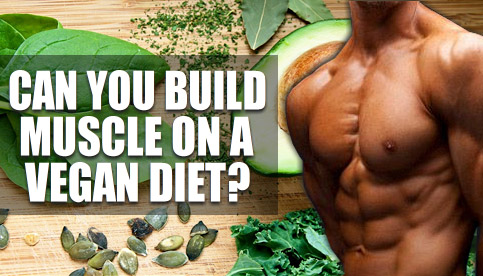
Although many people would consider the term “vegan bodybuilding” to be somewhat of an oxymoron, the popularity of plant-based diets has been steadily rising within the fitness community over the past few years.
Whether it be for reasons of health, animal ethics or the environment, it seems that more and more people out there have been opting to either reduce or totally eliminate animal products from their diet as the awareness around these issues has increased.
Health and ethics aside though, in this post I want to address the topic of plant-based diets purely from the standpoint of bottom line effectiveness on muscle growth…
That is, will a vegan bodybuilding diet allow you to build muscle and gain strength as effectively as a diet that includes both plants and animal products?
Do you need meat, eggs and/or dairy in order to make gains at your maximum capacity?
Let’s go over it…
Building Muscle On A Vegan Bodybuilding Diet: Can It Be Done?
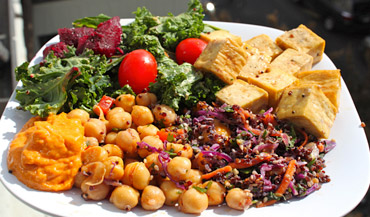
The reality is this…
When it all comes down to it, proper muscle building nutrition is really just a numbers game.
Your body has specific requirements in terms of total protein, carbohydrates, fats, fiber and micronutrients, and as long as you’re able to meet those needs consistently each day through your food intake, you’ll be able to build muscle effectively.
Remember: your body doesn’t view your nutritional intake in terms of individual food items; all it sees is the complete overall picture through a combination of all the foods you consume in total.
So the question is, can those needs be met using plant sources only, or are animal products somehow required in order to land on the proper calorie and macronutrient numbers for optimal muscle growth?
The simple answer is this…
As long as you plan your diet out accordingly, there’s no reason why you can’t meet all of your nutritional needs for building muscle using a 100% vegan bodybuilding diet.
It may require a bit more work this way since plant-based foods are generally lower in total calories and protein on average, but as long as you do your research and lay things out in advance then this way of eating can certainly be used to pack on muscle size and strength at your maximum capacity.
Protein
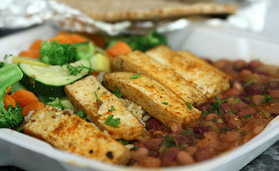
This is the main area that lifters seem to be concerned with, thinking that a vegan muscle building diet simply won’t allow them to get in sufficient protein each day to maximize their gains.
The reality is that there are plenty of high protein plant-based foods available that will easily allow you to consume all of the protein and amino acids that your muscles need for optimal growth.
A few examples among many include…
- Beans (16g per cup)
- Lentils (18g per cup)
- Tofu (18g per cup)
- Quinoa (8g per cup)
- Amaranth (7g per cup)
- Chickpeas (15g per cup)
- Seitan (18g per 3oz.)
- Nuts (Varies – almonds provide 8g per quarter cup)
- Tempeh (12g per cup)
- Edamame (18g per cup)
- Whole Grains (Varies – Ezekial bread provides 8g per two slices)
- Soy Milk (8g per cup)
- Green peas (8g per cup)
- Meat Substitutes (Varies depending on product/brand)
All of these sources provide a significant amount of protein per serving as you can see, and including just a few of them throughout the day can add up very quickly.
On top of this, you can easily supplement with a vegan protein powder as well to make things even easier.
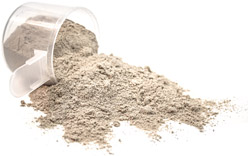
There are many plant-based powders out there that deliver just as much protein per scoop as whey, and with 1 or 2 servings added into your diet each day, hitting total protein needs really shouldn’t be an issue at all.
This is especially true considering that most lifters actually require far less protein per day than they think.
Although I’ve traditionally recommended 1 gram per pound of body weight daily just to be on the “safe” side, most research still shows no clear benefit beyond about 0.8 grams.
That equals out to around 120 grams of protein per day for a 150 pound individual… 140 grams for a 175 pound individual… and 160 grams for a 200 pound individual.
Through a combination of the high protein plant-based foods I previously outlined along with all of the tag-along protein you’ll get from other sources, PLUS the addition of a vegan protein supplement if necessary, meeting those requirements should not be difficult at all.
Some people will point out that plant-based sources generally have inferior amino acid profiles and lower absorption rates in comparison to animal proteins, and while this is technically true on a gram for gram basis, it still won’t make a difference in the overall picture.
This is because your body only requires a limited amount of individual amino acids in order to maximize protein synthesis anyway, and as long as your total daily protein needs are being met you’ll still receive more than enough.
Just because “some protein is good” does not mean that “more is better”, and going above and beyond what your body requires to optimize muscle growth in a given day isn’t going to somehow improve your results.
Fats
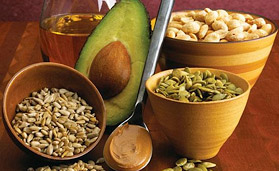
Consuming adequate fat each day is important when it comes to optimizing muscle building hormone levels and controlling appetite, and a vegan bodybuilding diet can easily provide enough fat in order to accomplish that.
I generally recommend that you get around 25% of your total calories from fat, and vegan sources such as nuts, nut butters, seeds, avocado and healthy oils will help you hit that figure without any problems.
Carbohydrates
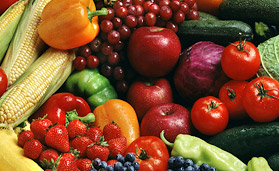
This is of course no issue whatsoever, as the majority of foods that vegan diets are based around are already high in carbohydrate content by default.
So when it all comes down to it, as long as you plan things out properly, you can certainly meet all of your needs in terms of total calories, protein, fats and carbs in order to build muscle and gain strength consistently on a vegan diet.
But that’s the one key point here: you need to plan things out!
The Importance Of Tracking Your Vegan Muscle Building Diet
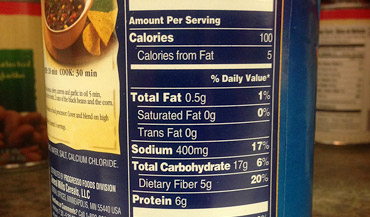
Although it is possible that you could simply “wing” your vegan diet and still make gains that way, it’s far less likely that you’ll be able to do this successfullly in comparison to a person who does consume meat, eggs and dairy products.
The simple reason for this is that most plant-based foods are by their very nature lower in total calories, protein and fat, and if you don’t track things adequately then there is a decent chance that you’ll simply under-eat.
You may end up consuming too few total calories, not enough protein, or insufficient fat, and this could either significantly negatively impact your gains or eliminate them altogether.
This is why, on average, if you took the total vegan population in comparison to those who do consume animal products, vegans will tend to be thinner and less muscular.
This isn’t because a vegan diet is inherently inferior for putting on muscle, but simply because the average person out there does not track their calorie or macronutrient intake and thus ends up consuming less total calories and protein by default.
This is why so many people have an image of vegans as being “weak and skinny” and think that it’s simply not possible to build muscle that way.
However, it’s not the diet itself that is the problem but rather the fact that it simply requires more work to specifically tailor a vegan diet for maximizing muscle growth.
So, if you are planning to stick with a vegan bodybuilding diet to reach your goals, just make sure that you’ve done your research first and that your diet is laid out in such a way that all of your individual macronutrient needs are in fact being met each day.
Vegan Bodybuilding Diets: The Bottom Line
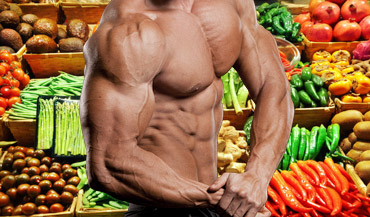
Although it may require a bit of extra research and planning, the bottom line is that a vegan muscle building diet can certainly provide all of the raw materials that your body needs to build muscle and gain strength optimally.
It just comes down to knowing what your individual needs are in terms of total calories, protein, carbs and fats, and then laying out a plant-based diet with food sources that allow you to meet those needs.
As long as you do that and are consistent, there’s no reason why you can’t pack on size and strength just as effectively as anyone else.
If you found this article helpful, make sure to sign up for your FREE custom fitness plan below...




